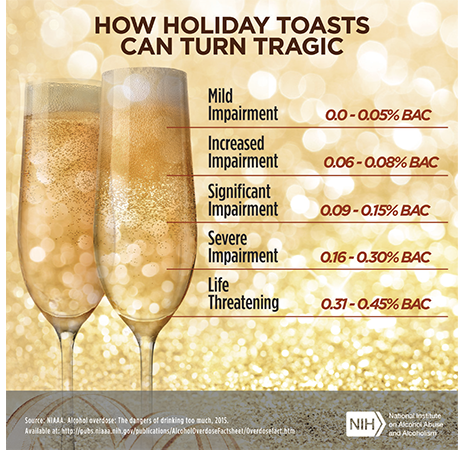
In order to help people celebrate safely this holiday season while avoiding unnecessary negative consequences, the National Institute on Alcohol Abuse and Alcoholism (NIAAA) has provided a fact sheet on the truth about holiday spirits. People tend to drink beyond their limits during this season than at other times of the year, and the direct result is often adverse consequences that range from fights and falls to car crashes and accidental fires. Celebratory drinking should not be a reason to open the door to a careless tragedy.
The focus of the NIAAA fact sheet is to challenge the myths about holiday drinking and drinking in general. These popular beliefs about how quickly alcohol affects the body and how long the effects of drinking last can prove to be dangerous. Since critical decision-making abilities and driving-related skills are already diminished before physical signs of intoxication appear, such myths often result in drunk driving and deadly accidents.
Three NIAAA tips to keep in mind if you choose to drink:
• Pace yourself with no more than one drink per hour, and no more than four drinks for men or three for women per day.
• Use drink spacers—make every other drink a non-alcoholic one.
• Use a designated driver, meaning someone who forgoes all alcohol, not just the person in your group who drank the least.
In the thrall of holiday drinking, it is often easy to misjudge the lasting effects of alcohol. For example, many people believe that by stopping drinking and having a cup of coffee, they will sober up. Caffeine may help with drowsiness, but not with the effects of drinking on decision-making or coordination. The body needs time to metabolize alcohol and then to return to normal.
Alcohol continues to affect a person long after the last drink has been finished. Even after the party stops, alcohol lingers in the bloodstream, impairing judgment and coordination for hours. Since individuals are so different, it is difficult to give specific advice about drinking. There is no proven way to speed up the brain’s recovery from alcohol, and the magical strategies of your friends often can be a one-way ticket to a drunk tank, a felony on your record or, even worse, the morgue.
